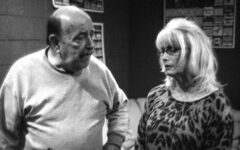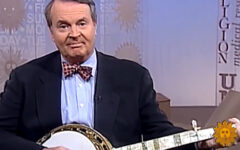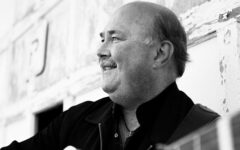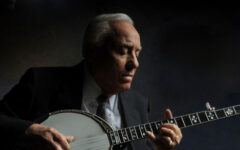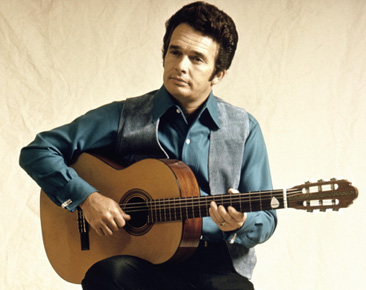
 I’m sure most of our readers have heard by now of the passing of the great Merle Haggard today, departing on his 79th birthday. As is appropriate, the news is a major media story in the entertainment industry. Such was his importance to country music.
I’m sure most of our readers have heard by now of the passing of the great Merle Haggard today, departing on his 79th birthday. As is appropriate, the news is a major media story in the entertainment industry. Such was his importance to country music.
All the stories and obituaries will mention his career and biographical highlights: his detention at San Quentin State Prison in 1958 after a burglary arrest, his eventual pardon by then-Governor of California Ronald Reagan, his more than three dozen #1 hits, his part (with Buck Owens) in creating “the Bakersfield sound,” his defiantly pro-American songs during the anti-Vietnam War era, his multiple marriages, and his long string of commercially and critically successful recordings.
There is no country singer alive today that can have escaped the influence of Haggard’s music, just as was said when George Jones passed two years ago. The Hag is remembered as a pure country singer, and an irascible character who would say exactly what he thought without regard to the manners and norms of the day. In more recent years he had pointed criticism for the sort of music that was dominating country airways, for its triviality and its deviation from the sound he helped pioneer.
Again, as with Jones, Haggard had a huge influence on bluegrass music as well as country. Even if you don’t hear it immediately in their voices, ask your favorite bluegrass singers about The Hag, and you will be sure to hear a string of superlatives, followed by an admission that he had left a deep imprint on their music.
Steve Gulley spoke for many when he shared this statement shortly after learning of Haggard’s passing.
“
The man who, in my opinion, was and still is the greatest singer/songwriter in the history of country music has passed away. He, along with George Jones, instilled in me the love of real country music. Again, in my humble opinion, they were the two greatest singers country music ever produced. The thing that Merle had over them all was his ability to write songs that said more in 2-3 minutes than most novels could say in hundreds of pages. He was, as they like to say, ‘The Poet Of The Common Man.’ He made me and so many more want to write songs and create music that actually meant something. We’re all still playing catch up. You were, quite simply, the best. Rest easy, Hag. You set the standard for us all and left a legacy that will last forever.”
James King, as soulful a singer as we have in bluegrass, recalled the time he met Haggard about 15 years ago when he learned of his passing.
“In ’98 at the Hilltop recording studio in Nashville I was finishing the final mix of Thirty Years of Farming, and my recording engineer Steve Chandler told me that Merle would be coming in to finish his recording around 7:00. I heard the eagle backing into the parking lot, and about 30 minutes later I casually go downstairs to get a drink (but I’m really going down there to meet Merle.) As I reach the bottom of the steps I turn to go to the Coke machine, and out the studio came Merle Haggard… and I stopped in my tracks and froze. We talked for about an hour. Merle Haggard was one of the nicest guys I ever met, and I was honored to meet the legend that day. Rest in peace.”
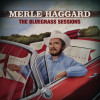 Haggard recorded one specifically bluegrass album in 2007. The Bluegrass Sessions was jointly released by McCoury Music and Hag Music, and featured mostly new songs cut with a group of Nashville super pickers. It included a duet with Alison Krauss on Mama’s Hungry Eyes, and help from Charlie Cushman on banjo, Marty Stuart on mandolin and guitar, Rob Ickes on reso-guitar, Ben Issacs on bass, and Carl Jackson on harmony vocals.
Haggard recorded one specifically bluegrass album in 2007. The Bluegrass Sessions was jointly released by McCoury Music and Hag Music, and featured mostly new songs cut with a group of Nashville super pickers. It included a duet with Alison Krauss on Mama’s Hungry Eyes, and help from Charlie Cushman on banjo, Marty Stuart on mandolin and guitar, Rob Ickes on reso-guitar, Ben Issacs on bass, and Carl Jackson on harmony vocals.
The album created something of a stir come Grammy time later that year, as the NARAS nominating committee refused to allow it to appear in the bluegrass category, insisting that it was a country album. Though many grassers were frustrated by that decision, the truth is that it was primarily an acoustic country record, with bluegrass accompaniment. But it served as a fine tribute to his love for our music, and is remembered along with his other tributes to Texas Swing and Bob Wills.
Over the years many of his songs were re-recorded by bluegrass artists. Working Man Blues is a jam session standard, with other prominent examples like Seldom Scene’s cut of Sing Me Back Home on their Act 3 album in 1973, and Back To The Barrooms from J.D. Crowe & The New South on Come On Down To My World in ’99.
Ronnie Reno, who produced The Bluegrass Sessions and toured with Hag in the 1970s, also shared his thoughts.
“I am incredibly saddened by the passing of my dear friend, Merle Haggard….today, of all days…on his 79th birthday. I first met Merle while working with The Osborne Brothers. I worked with Merle for about 8 years and we went through so much together. There were good times, and there were other times….well….that only he and I could laugh about. He loved to hear me laugh, for some reason. He would call me up just to hear me laugh when he needing some cheering. We always clicked and had a special friendship.
I was hoping to see him last month in Nashville, but he fell ill and I’ve been praying and talking with him often throughout this time. Today, I was contacted by the family and found out that Merle had expressed his desire to have me sing Life’s Railway to Heaven at the funeral. What a fitting song for such an amazing man. He leaves an enormous legacy and will be truly missed.
Rest in peace, Merle Haggard. There will never be another.
UPDATE April 7: Russell Moore of IIIrd Tyme Out also shared a comment about this very definition of a superstar:
“Merle Haggard’s musical influence runs deep, far and wide to say the least. He could say more in one line than most can in an entire song. I got to cross off an item from my ‘bucket list’ several years ago when I got to see Merle perform live at a bluegrass festival in California. He sang for an hour and a half, never repeated a song and only sang about half of most of the songs he performed, and they were ALL hit songs. It really gave me the understanding of just how powerful and impressive his music was and still is today. Another country music icon, George Jones, once posed a question in the song, ‘Who’s gonna fill their shoes?’ Iknow the answer to this in respect to Merle Haggard….no one. Rest in peace Merle.”

